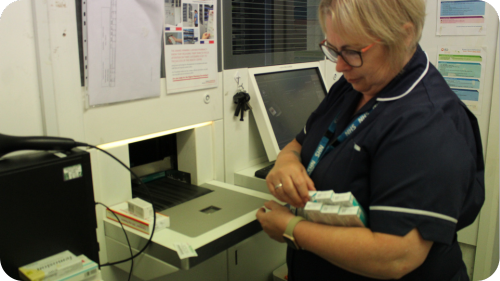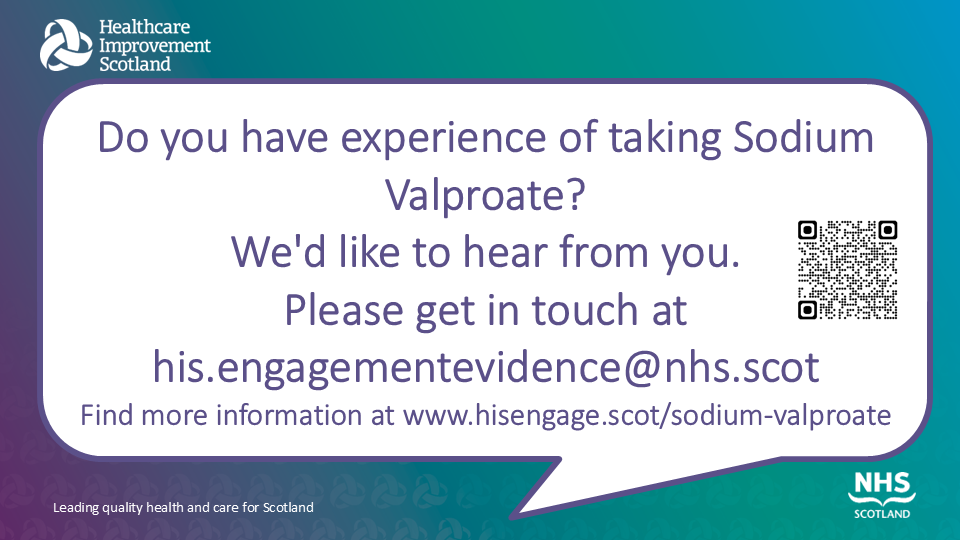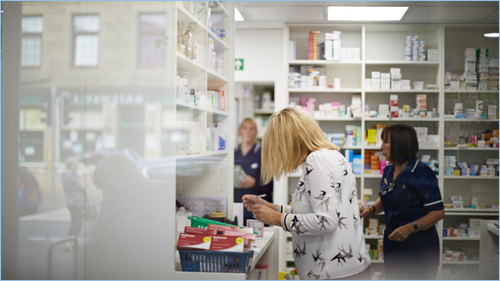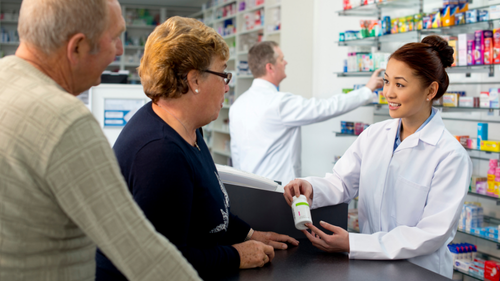New Local Services Procedure
Published: 04/01/24

Each local NHS Health Board has the ability to develop bespoke local pharmacy services to suit the needs of local communities and patients - this is why you find differences across borders in what is asked of you when, for example, supporting people who are prescribed opiate replacement therapy.
You will also see that some Health Boards have services that others don't - again, an example would be the Oral Nutritional Supplement service in NHS Greater Glasgow and Clyde pharmacies that isn't found elsewhere.
This is how many of our now national services started life (e.g. Pharmacy First PGDs), and is a great way to test out new ideas. The agreed process of agreeing and launching these services involves the Health Board pharmacy team working closely with a representative committee of pharmacy owners that have been elected for this purpose. Most of the time, this process is understood and followed, but occasionally other Health Board staff may not be aware of these ways of working and may (with the best of intentions) make direct approaches to a pharmacy or several pharmacies to test out a new service. We have seen a few examples of this recently which have had to be rolled back to go through the proper channels to ensure that what has been agreed is safe, appropriate and represents a fair opportunity for community pharmacy.
It is critical that if you are approached to take part in a pilot or new service, that you check whether the local Community Pharmacy owners' committee has been consulted. If you or the Health Board representative are unsure, check in with your pharmacy owner/area manager or contact the policy office at CPS on enquiries@cps.scot
This week’s MCR Ready Reckoner has been updated and is now available to download or you can view it via the App.
Read Victoria’s incredible real-world story of how a routine consultation through the NHS Pharmacy First Plus service led to the urgent referral of a patient who was later diagnosed with leukaemia.
Do you have questions about the updated Smoking Cessation Varenicline Service? Join us on Wednesday 7th May at 19:30 to 21:00 on Microsoft Teams - Click here to Register
Chest Heart and Stroke Scotland are running online training sessions on the FAST tool for identifying stroke, and community pharmacy team members are invited to join.
This Circular advises Health Boards and community pharmacy contractors of an updated Patient Group Direction (PGD) that is to be implemented for smoking cessation under the community pharmacy Public Health Service.
Our colleagues at Public Health Scotland (PHS) have asked that we disseminate the latest RADAR update to community pharmacy teams to inform you of concerns related to ongoing localised clusters of drug harms in multiple areas in Scotland.
Healthcare Improvement Scotland are gathering views and experiences from people currently taking Valproate, or those who have recently stopped.
Check out our Policy & PR Pharmacist, Sarah Scott, speaking to BBC Radio Scotland this morning about how people can manage their hay fever symptoms and access expert support through NHS Pharmacy First Scotland.
Please find attached NHS PCA(P)(2025)05 circular advising of a new Serious Shortage Protocol in place for Estradot® (Estradiol) 25 micrograms / 24 hours transdermal patch until Friday 2 May 2025.
Please find attached NHS circular PCA(P)(2025) 04 - Extension to Serious Shortage Protocols (SSPs) for Estradot (estradiol) 50, 75 and 100mcg patches, advising that the SSPs for the noted Estradot (estradiol) products have been extended until Friday 2 May 2025.
We are pleased to announce that following the close of the nominations on Thursday 3rd of April 2025, Martin Green, who stood unopposed for the position of Chair of Community Pharmacy Scotland and James Semple, who also stood unopposed for the position of Vice Chair, have both accepted these appointments for the 2025-2028 term.
Here is a round-up of all the important news this week, including the latest updates on Independent Prescribing and Community Pharmacy vacancies within the network.
Deans Pharmacy in Wishaw seeks a manager for one of Scotland's busiest pharmacies, offering robotic dispensing and a 24-hour collection point. Strong leadership and communication skills are essential. Competitive salary offered. Apply Now!
The approved list of products for the NHS Pharmacy First Scotland Service has been updated from the 1st April 2025.
It is important that we have an up to date record of our CPIPs and Trainees. If there are any changes to your circumstances, please let us know by completing the attached form and sending it to us on enquiries@cps.scot.
As a part of our work with the Scottish Government and Public Health Scotland, we regularly raise lines of concern and work to secure adjusted prices for these. We also work with them regularly to review lines which have now stabilised and remove these as appropriate.
NES are now in the process of gathering expressions of interest for FTY facilitators to support online and in-person training sessions for the next cohorts of NES FTY students in 2025/26.
When submitting your bundle of prescriptions to P&CFS, one of the things that should always be included is your yellow GP34 form, as it is a legal requirement. You will need to have counted your prescription submission before completing, which involves totalling your number of forms and items.
Late last week, the UK Government confirmed that they will soon make the necessary changes to the Human Medicines Regulations 2012 to enable 'hub and spoke' dispensing between different legal entities (businesses), which is not currently permitted.
Community Pharmacy Scotland (CPS) welcomes the recent development in England of community pharmacist access to patient GP record data on medications, investigations and observations. Whilst positive developments have been made in Scotland.
The Scottish Government has published its NHS Operational Improvement Plan, which describes how the commitments outlined in the First Minister’s January speech will be delivered. In his speech, First Minister John Swinney announced plans to make it easier for people to see a first point of contact with the NHS, for example a community pharmacist. The Operational Improvement Plan states that the Scottish Government will further expand the NHS Pharmacy First Scotland service, enabling community pharmacists to treat a greater number of clinical conditions.
NHS Education for Scotland have launched a new eLearning module on menopause, and it is available now on Turas Learn: Menopause Module.
Please note: Due to ongoing discussions with Public Health Scotland (PHS) the final round of Adjusted Prices for March are likely to be agreed and published on Tuesday 1st April 2025.
This Circular advises community pharmacy contractors that the Serious Shortage Protocol for Estradot® (Estradiol) 50 micrograms / 24 hours transdermal patch (SSP079), a hormone replacement therapy (HRT) product, due to expire on 21 March 2025 has been extended until Friday 4 April 2025.
Here is a round-up of all the important news this week, including the latest updates on Independent Prescribing and Community Pharmacy vacancies within the network.
NHS Inform offers Women’s Health pages with advice and support. Resources for promoting these pages and raising awareness about endometriosis are available from the SG Campaign Resource Centre. Community pharmacies in Scotland provide support for women’s health issues through Pharmacy First.
Your next courier collection is scheduled for Thursday, April 3rd, 2025. We have produced the following guidelines for your prescription bag submissions.
Community pharmacists who completed the CPS/NES Independent Prescribing Training can attend a Teach & Treat (T&T) session after qualifying and completing four Clinical Skills days. These sessions, led by experienced prescribers, offer valuable support. New hubs are now open in Saracen Pharmacy and Garscadden. For details, check your TURAS account.
NHS Education for Scotland (NES) is seeking volunteers to help develop the Pharmacy Foundation Training assessment for 2025. Subject matter experts are needed for 45-minute interviews via phone or Microsoft Teams to create scenarios for Situational Judgement Tests (SJTs). Interested individuals should contact Jo at Work Psychology Group to schedule an interview. No financial compensation is provided.






























Lindsay and Gilmour are looking for a Full-Time Base Pharmacist to join their team at Lindsay and Gilmour Pharmacy in Inverkeithing Cross, Fife. Click to find out more and apply…